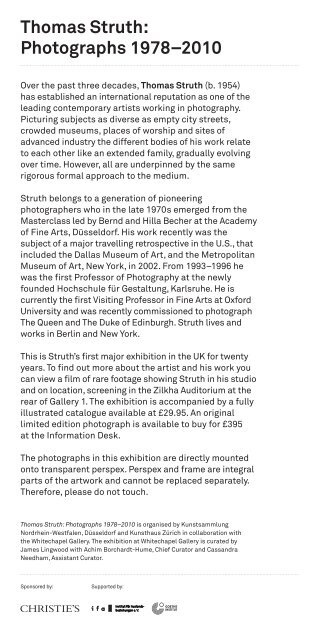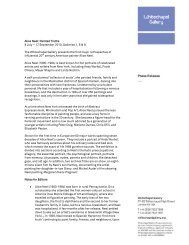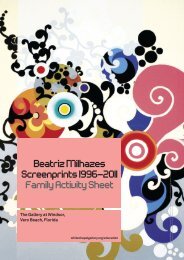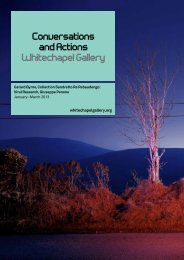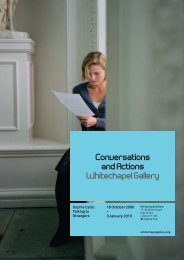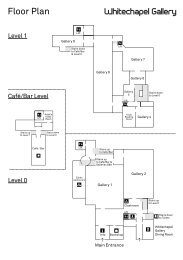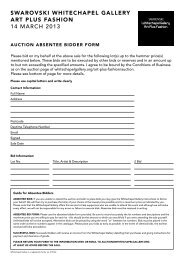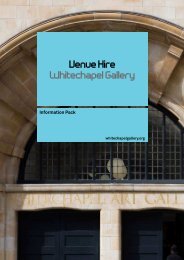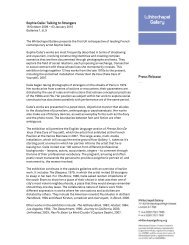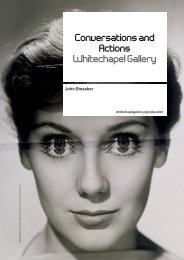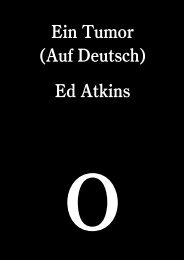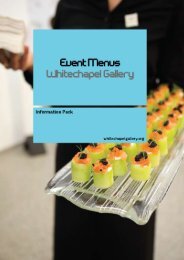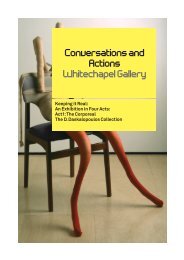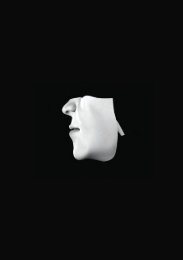Thomas Struth - Whitechapel Gallery
Thomas Struth - Whitechapel Gallery
Thomas Struth - Whitechapel Gallery
You also want an ePaper? Increase the reach of your titles
YUMPU automatically turns print PDFs into web optimized ePapers that Google loves.
<strong>Thomas</strong> <strong>Struth</strong>:Photographs 1978–2010<strong>Struth</strong>’s Museum Photographs reflect on the differentfunctions of art in an increasingly secular society.Focusing on the moment of contact between iconic worksof art and their audiences, <strong>Struth</strong>’s images vividly capturethe faith that people collectively invest in culturalachievements of the past. The majority of these imagesare unstaged with Pantheon, 1990 being a rare exception.Whilst working on the Museum Photographs <strong>Struth</strong>occasionally speculated on the possibility of reversingthe vantage point of spectator and work of art:‘I sometimes wished I could be the painting looking atthe faces of the audience.’ This is the perspective headopted in his series Audience, realised in 2004 over thecourse of one week at Florence’s Galleria dell’Academia,when he repeatedly photographed visitors awe-struckby Michelangelo’s sculpture of David.Rooted in the Museum Photographs, a number of worksmade in places of worship further questions the dynamicbetween systems of faith and representation. The evenfocus in San Zaccaria, for example, puts the figures of theMadonna and Saints in Giovanni Bellini’s altarpiece ona par with church-goers and culture-hungry tourists.A new body of photographs depicting sites at the cuttingedge of technology continues <strong>Struth</strong>’s fascination withcomplex visual structures and humankind’s constantstriving to imagine and to realise ever more ambitiousprojects. At the same time, the panoramic close-up of thespace shuttle undergoing repair work and the vastphotograph of an oil rig under construction in Korea,one of <strong>Struth</strong>’s largest images to date, query the collisionbetween science, politics and power.<strong>Thomas</strong> <strong>Struth</strong>: Photographs 1978–2010 is organised by KunstsammlungNordrhein-Westfalen, Düsseldorf and Kunsthaus Zürich in collaboration withthe <strong>Whitechapel</strong> <strong>Gallery</strong>. The exhibition at <strong>Whitechapel</strong> <strong>Gallery</strong> is curated byJames Lingwood with Achim Borchardt-Hume, Chief Curator.Sponsored by:Supported by:
<strong>Thomas</strong> <strong>Struth</strong>:Photographs 1978–2010Cities have been an enduring preoccupation for <strong>Struth</strong>since the mid-1970s, from photographs of emptystreets to panoramic views of the sprawling 21st centurymetropolis.Whilst studying at the Düsseldorf Academy of Fine Arts<strong>Struth</strong> decided systematically to document the ordinarystreets of a reconstructed German city. The strongcentral perspective which gives the images anextraordinary sense of depth creates a unifying formalframework for the series. Subsequently, <strong>Struth</strong> adopteda similar approach to photograph the depopulatedstreets of other European cities including Rome, Naples,London and Edinburgh, as well as Manhattan, New Yorkand Tokyo. Over the past decade, <strong>Struth</strong> has continued torevisit the theme of the city widening both its geographicremit as well as its formal scope, switching from blackand white to colour photography and adopting morevaried perspectives.The Paradise series is conceived as an installation withseveral works surrounding the viewer. The first imageswere taken in the tropical rainforest in the northeast ofAustralia with subsequent locations including Brazil,Peru, Hawaii and Florida. With their dense screens ofvegetation void of any sign of human interference, theParadise pictures are markedly different from <strong>Struth</strong>’susual focus on culture and place a heightened emphasison the experience of looking. As <strong>Struth</strong> himself hascommented: ‘Although they have a strong feeling of time,they are a historical. There is nothing to discover, no storyto be told. They have more to do with the self.’<strong>Thomas</strong> <strong>Struth</strong>: Photographs 1978–2010 is organised by KunstsammlungNordrhein-Westfalen, Düsseldorf and Kunsthaus Zürich in collaboration withthe <strong>Whitechapel</strong> <strong>Gallery</strong>. The exhibition at <strong>Whitechapel</strong> <strong>Gallery</strong> is curated byJames Lingwood with Achim Borchardt-Hume, Chief Curator.Sponsored by:Supported by:
<strong>Thomas</strong> <strong>Struth</strong>:Photographs 1978–2010Since the mid-1980s, <strong>Struth</strong> has made an extendedseries of Family Portraits in different cultures aroundthe world.Similar to the photographs made in historic sites theydemonstrate <strong>Struth</strong>’s continuing interest in the way inwhich his work relates to popular types of photographysuch as travel or family snapshots.Each Family Portrait is made within a similar set of rules.The portraits are not made to commission, instead theinitial invitation comes from the artist. <strong>Struth</strong> and thefamily then decide together on the location of thephotograph in their home or garden. Like the visitors inthe Museum Photographs, the members of each familyorganise and pose themselves rather than beingarranged by <strong>Struth</strong>. The only stipulation from the artistis that they look straight into the camera.The Family Portraits relate to <strong>Struth</strong>’s extensive travelswith the sitters largely drawn from a network of friendsand working associations. The formal similaritiesbetween the portraits of families from different culturalbackgrounds therefore reveal a certain sense ofcommonality amongst otherwise very different people.<strong>Struth</strong> himself has observed that ‘when you look atfamily photographs you understand through the tracessomething of what was going on, of the social structureof the time. The traces of structures, social andpsychological, are legible’.<strong>Thomas</strong> <strong>Struth</strong>: Photographs 1978–2010 is organised by KunstsammlungNordrhein-Westfalen, Düsseldorf and Kunsthaus Zürich in collaboration withthe <strong>Whitechapel</strong> <strong>Gallery</strong>. The exhibition at <strong>Whitechapel</strong> <strong>Gallery</strong> is curated byJames Lingwood with Achim Borchardt-Hume, Chief Curator.Sponsored by:Supported by:


